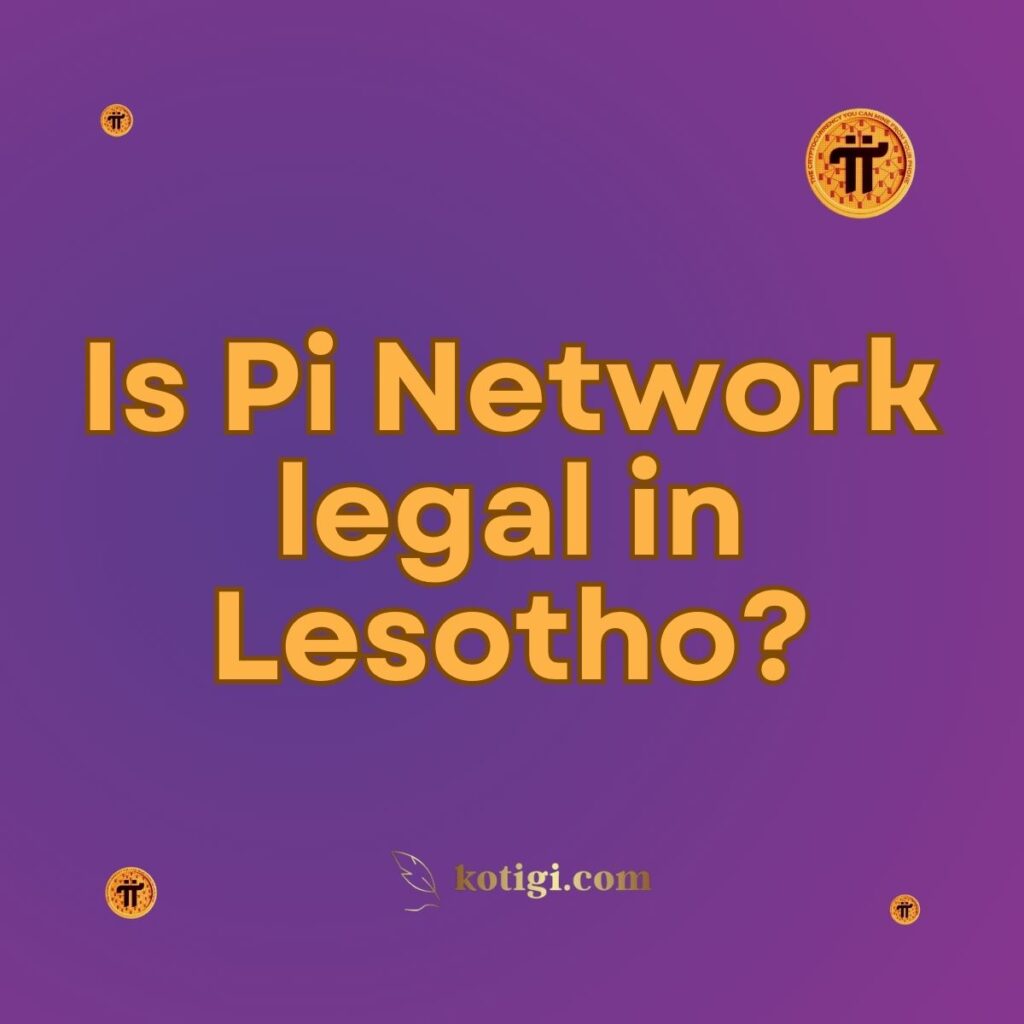
Is Pi Network legal in Lesotho?
Yes, Pi Network is legal in Lesotho. Although there are no specific regulations directly addressing Pi Network or cryptocurrencies, Lesotho allows the use of digital assets as long as users comply with existing financial laws and anti-money laundering (AML) standards.
Introduction
As Pi Network continues to grow globally, many users in Lesotho are curious about the legal standing of this cryptocurrency platform in their country. With evolving regulations around digital assets, it is important to understand whether Pi Network is legal and what implications this has for users. In this article, we’ll explore the legal framework surrounding Pi Network in Lesotho and what users should keep in mind to ensure compliance.
Cryptocurrency Regulations in Lesotho
Lesotho, like many countries in Africa, has not yet developed a comprehensive regulatory framework specifically for cryptocurrencies. However, the absence of detailed legislation does not mean cryptocurrencies are illegal. Users of Pi Network in Lesotho are currently free to mine and hold Pi tokens, provided they operate within the country’s existing legal and financial framework.
Lesotho’s Financial Regulatory Environment
The Central Bank of Lesotho (CBL) has not yet issued detailed guidelines regarding the use of cryptocurrencies. However, the CBL maintains a cautious approach toward the adoption of digital currencies, mirroring the stance of other central banks in the region. The legal status of cryptocurrencies like Pi Network remains neutral, meaning that while not explicitly recognized, they are not banned either.
Regulatory Caution on Cryptocurrencies
Like many developing economies, Lesotho’s financial authorities have expressed caution regarding the risks of cryptocurrency use. These risks include the potential for fraud, volatility, and lack of consumer protections. Despite these concerns, there has been no indication that Lesotho plans to ban the use of cryptocurrencies, allowing platforms like Pi Network to continue operating in the country.
How Pi Network Operates in Lesotho?
Pi Network’s growing user base in Lesotho reflects a broader trend of digital currency adoption in the region. As more people in Lesotho explore alternative financial systems, Pi’s mobile mining capabilities offer an accessible option for individuals looking to engage with the cryptocurrency space.
User Participation in Pi Network
In Lesotho, Pi Network users can mine Pi tokens on their smartphones, taking advantage of the platform’s user-friendly interface. Pi Network’s core team ensures that the network adheres to international standards, which also helps users in Lesotho stay compliant with global practices such as Know Your Customer (KYC) requirements.
KYC Compliance for Lesotho Users
All Pi Network users, including those in Lesotho, must undergo the KYC process to verify their identity and comply with anti-money laundering (AML) laws. This process ensures that the Pi Network remains compliant with global financial regulations, which also benefits users in Lesotho by adding a layer of security and legitimacy to their participation.
Legal Considerations for Pi Network Users
Although Pi Network is legal in Lesotho, users must remain vigilant and informed about the evolving regulatory landscape. Certain legal considerations are essential for ensuring compliance with the country’s financial regulations.
Anti-Money Laundering (AML) Regulations
Lesotho’s AML regulations are in place to prevent illicit financial activities, including money laundering and terrorism financing. Users of Pi Network must ensure that they do not engage in illegal activities through the platform, as any violations of AML laws could result in legal repercussions.
Consumer Protection and Financial Risks
While Pi Network provides security features like KYC to protect its users, Lesotho’s financial authorities have warned about the risks associated with cryptocurrency investments. These risks include the potential loss of funds due to volatility, fraud, or lack of consumer protection. Users must be cautious and take responsibility for securing their digital assets.
Future of Cryptocurrency Regulation in Lesotho
As digital currencies like Pi Network continue to gain traction in Lesotho, there is a likelihood that the government may introduce clearer regulations to govern their use. Pi Network users should remain informed about any regulatory developments that could affect their ability to use and trade Pi tokens in the future.
Comparisons with Other Countries’ Regulations
Understanding Lesotho’s stance on Pi Network can be further clarified by comparing it with neighboring countries and other African nations that have taken a similar approach to cryptocurrency regulation.
Cryptocurrency in South Africa
South Africa, one of Lesotho’s neighbors, has established more defined regulations around cryptocurrency use. While South African authorities have not banned the use of cryptocurrencies, they have issued clear guidelines regarding taxation and the legal status of digital assets. This sets a precedent that Lesotho could follow as the country explores its own regulatory framework for digital currencies.
Cryptocurrency in Botswana
Like Lesotho, Botswana does not have comprehensive regulations for cryptocurrencies. However, both countries have allowed their citizens to engage with digital currencies as long as they comply with general financial regulations. The neutral stance on cryptocurrencies in these countries allows Pi Network to operate without significant legal hurdles.
What the Future Holds for Pi Network in Lesotho?
As Pi Network continues to expand globally, its future in Lesotho looks promising, especially as the platform gains more users and attention. However, with the increasing popularity of cryptocurrencies, Lesotho’s financial authorities may introduce more detailed regulations to govern their use.
Potential Regulatory Developments
While there are currently no restrictions on using Pi Network in Lesotho, future regulatory developments could impact how users engage with the platform. It is important for Pi Network users to stay informed about any changes in the country’s legal framework regarding digital currencies.
Encouraging Innovation in the Digital Space
Lesotho has the potential to become more involved in the global blockchain and cryptocurrency space. By introducing supportive policies, the government could encourage innovation, allowing Pi Network and other blockchain-based technologies to thrive.
Staying Compliant in Lesotho
To ensure compliance with Lesotho’s financial regulations, Pi Network users must follow a few key steps. This includes adhering to the KYC process, keeping track of transactions for potential future taxation, and ensuring that they do not engage in illegal activities.
KYC and AML Compliance
All users of Pi Network must complete the KYC process, which helps ensure compliance with global financial regulations. This requirement is especially important in countries like Lesotho, where AML laws play a critical role in maintaining financial integrity.
Preparing for Future Taxation
Although Lesotho does not currently impose taxes on cryptocurrency transactions, Pi Network users should keep detailed records of their activities. If future tax regulations are introduced, having accurate records will help users comply with any legal requirements related to cryptocurrency earnings.
Conclusion
Pi Network is legal in Lesotho, and there are currently no specific laws prohibiting its use. However, as the regulatory landscape continues to evolve, users must remain informed about changes to the legal environment surrounding cryptocurrencies. By complying with existing financial regulations, including KYC and AML requirements, users in Lesotho can continue to participate in Pi Network safely and securely.
Key Takeaways
- Pi Network is legal in Lesotho, with no specific laws restricting its use.
- The Central Bank of Lesotho has not banned cryptocurrencies, but users are advised to follow existing financial laws.
- KYC compliance is required for all Pi Network users to ensure adherence to anti-money laundering regulations.
- Users must be cautious of potential financial risks, such as fraud and lack of consumer protection.
- Future regulations may be introduced, so Pi Network users in Lesotho should stay informed of any changes in cryptocurrency laws.





